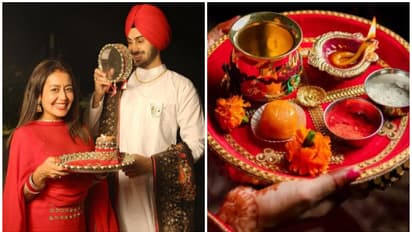From ancient roots to modern celebrations: Know why Karwa Chauth is cherished in India

Synopsis
The celebration is thought to have been named for a woman by the name of Karwa, whose life story represents the tenacity and will of a faithful wife.
India is a country of colorful festivities and rich cultures. Several festivals, such as Navratri, Gudi Padwa, Ganesh Chaturthi, and Karwa Chauth, are celebrated with great zeal and devotion. Now that Navratri is over, it's time for Karwa Chauth, an occasion dedicated to compassion and love. Karwa Chauth is the festival where married women in our nation fast for their husbands' long lives and the joys of their marriages. The celebration occurs on Chaturthi, the day following the full moon in the Kartik month.
Karwa Chauth started as a tradition in the northwestern region of India. However, married women from Punjabi, Hindu, Sikh, and other communities across the country now celebrate Karwa Chauth. And not just women of modern India; the men are also keeping the Karwa Chauth fast for the well-being and happiness of their wives.
Now that Karwa Chauth is quickly approaching, let's take some time to understand its meaning, the rationale behind its celebration, its customs, and the tales behind this festival of 'Suhagans'.
Why is Karwa Chauth celebrated in India?
The word Karwa means a clay pot and Chauth means Chaturthi. Thus, the meaning of Karwa Chauth is offering arghya in a clay pot on the Chaturthi of the Kartik month. Married ladies celebrate the festival for their spouses' longevity, safety, and happiness in life.
On the day of Karwa Chauth, married women wake up early and eat sargi before sunrise. Sargi is a pre-dawn meal prepared and eaten by the married ladies before they keep their fast. In the Punjabi culture, the sargi is offered to the bahu by her mother-in-law. After eating the sargi, women began their 'nirjala vrat' from sunrise to moonrise.
After the moonrise, the ladies break their fast after seeing the moon through a round sieve and offering it her arghya. Then the married women look at their husbands through the same sieve, after which the husbands help the ladies break their fast. Several married women get all dressed up and also opt for mehendi to celebrate the festival.
Mythological tales behind Karwa Chauth
The celebration is thought to have been named for a woman by the name of Karwa, whose life story represents the tenacity and will of a faithful wife. The tradition states that while taking a bath in a river, Karwa's spouse was attacked by a crocodile. For her husband, Karwa used cotton yarn to bind the crocodile and prayed to Yama, the God of Death, asking him to spare her spouse and punish the crocodile. Yama sent the crocodile to hell and gave her husband a long life because he was impressed by her devotion and tenacity. The story highlights the idea that a wife's prayers and love are stronger than death.
Historical significance of Karwa Chauth
Karwa Chauth started in the northwest, where military operations and regimes were founded to defend the nation against the Mughal invasions, according to its historical significance. But the women of these military personnel, police officers, soldiers, and other armed forces members made the decision to band together and fast in order to pray to God for their husbands' survival.